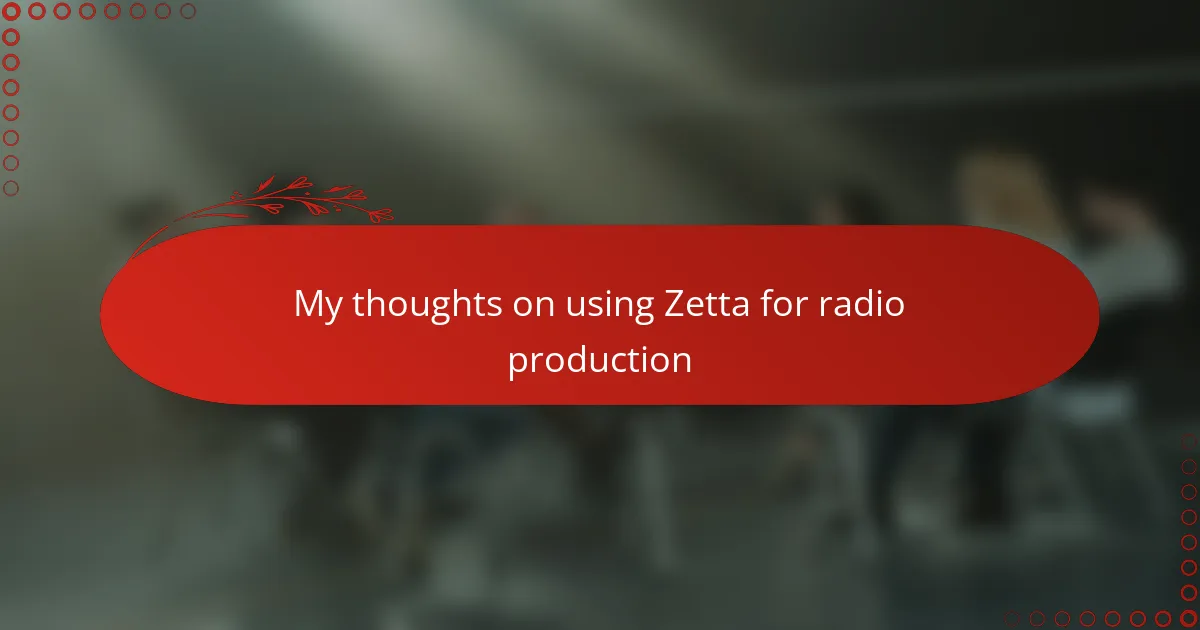Key takeaways
- Radio broadcasting fosters community connection and serves as a vital source of information and cultural expression.
- Zetta software enhances radio production with robust automation, simplifying complex workflows and improving team collaboration.
- Users may face challenges such as a learning curve and occasional glitches, requiring some technical savvy for effective integration.
- Regular system checks and mastering automation features can significantly enhance the overall experience with Zetta.
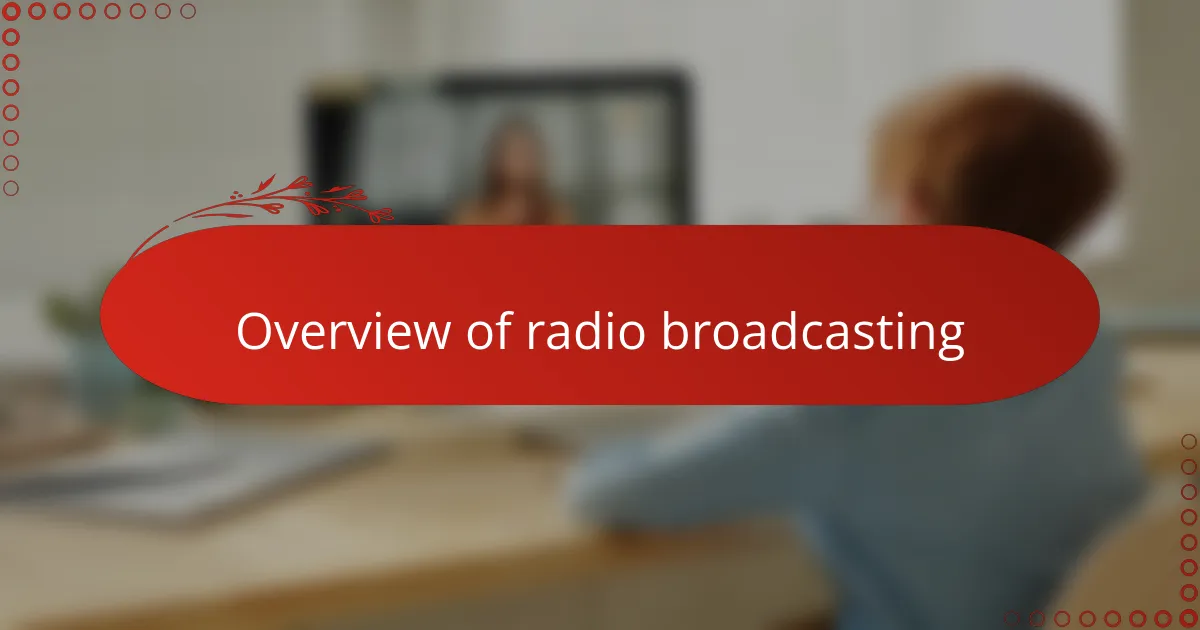
Overview of radio broadcasting
Radio broadcasting has always fascinated me with its unique power to connect communities and bring stories to life through sound alone. Have you ever stopped to think about how a simple voice or song on the airwaves can evoke such strong emotions and shared experiences? This blend of technology and creativity makes radio an endlessly captivating medium.
In my experience, the beauty of radio lies in its immediacy and intimacy. Unlike other forms of media, radio feels personal—like someone is speaking directly to you, no matter where you are. It’s this direct bond that keeps audiences tuned in and trust in the broadcaster growing over time.
But radio isn’t just about entertainment; it’s also a vital tool for information and cultural expression. On any given day, radio stations serve as lifelines during emergencies, platforms for local artists, and forums for public dialogue. That multifaceted role is what makes radio broadcasting so critical and endlessly dynamic in today’s fast-changing media landscape.
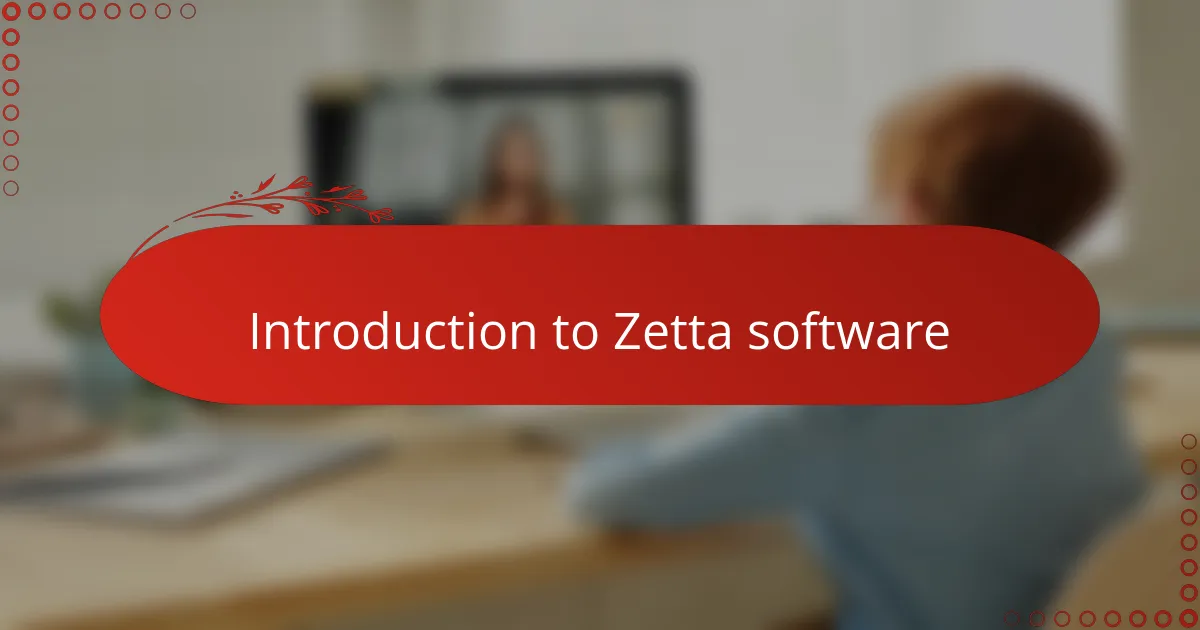
Introduction to Zetta software
When I first came across Zetta software, I was intrigued by its promise to streamline radio production with a user-friendly interface. It felt refreshing to work with a tool that understands the fast-paced nature of broadcasting while offering robust automation features. Have you ever found yourself juggling too many tasks during a live show? That’s exactly where Zetta shines, helping keep everything on track without feeling overwhelmed.
What struck me most about Zetta is how it balances power with simplicity. From scheduling playlists to handling multiple audio streams, it adapts effortlessly to different station needs. Personally, I appreciated how intuitive the workflow felt, making it easier to focus on creativity rather than getting bogged down in technical details.
Zetta’s design clearly reflects an understanding of real-world radio environments. The way it integrates with hardware and supports live assist modes gave me confidence that it was built by people who truly know what broadcasters face daily. For anyone invested in radio production, Zetta isn’t just software—it feels like a reliable partner in the booth.
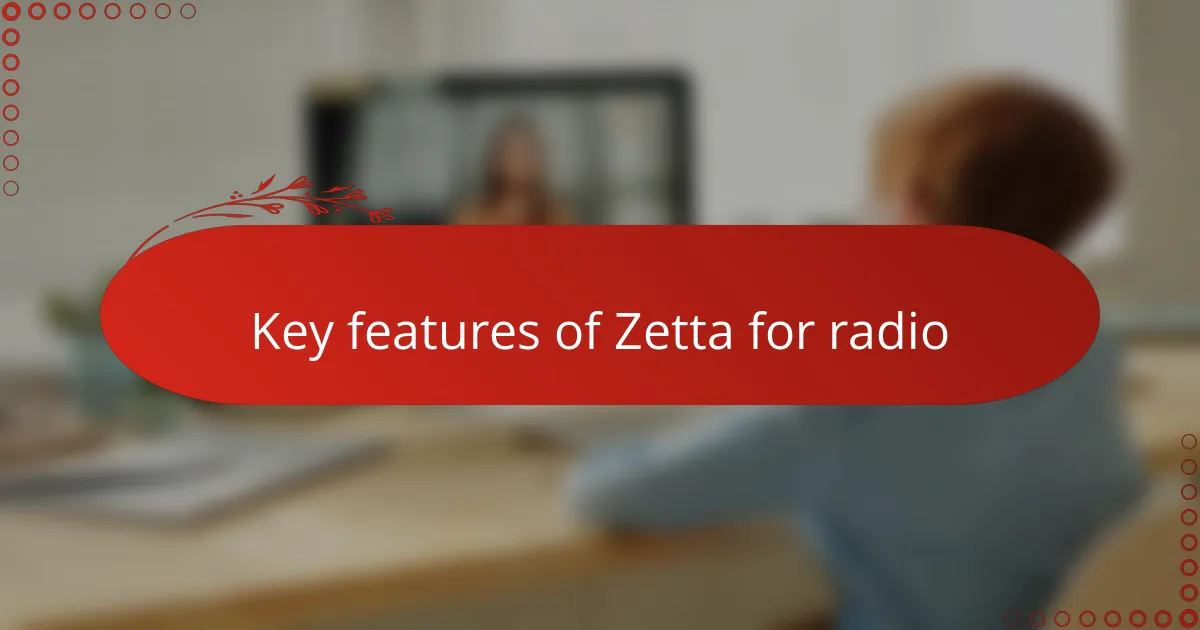
Key features of Zetta for radio
One of the standout features of Zetta for radio is its robust automation system. I remember a hectic morning when I had back-to-back live segments, and Zetta’s automation kept everything running smoothly without me having to micromanage every cue. Isn’t that what every broadcaster dreams of—having technology that anticipates your needs and reduces stress behind the scenes?
Another aspect that caught my attention is how Zetta handles multiple audio streams seamlessly. In my experience, radio production often involves juggling music, ads, jingles, and live inputs all at once. Zetta’s ability to layer and control these elements effortlessly gave me the freedom to focus on content rather than technology, which truly transformed my workflow.
Lastly, the integration capabilities of Zetta are impressive. It works beautifully with various hardware setups and live assist modes, which I found incredibly reassuring during live broadcasts. Have you ever worried about technical glitches in the middle of a show? With Zetta, that worry diminished because it felt like the software was designed to keep everything stable and adaptable, even when things didn’t go exactly as planned.
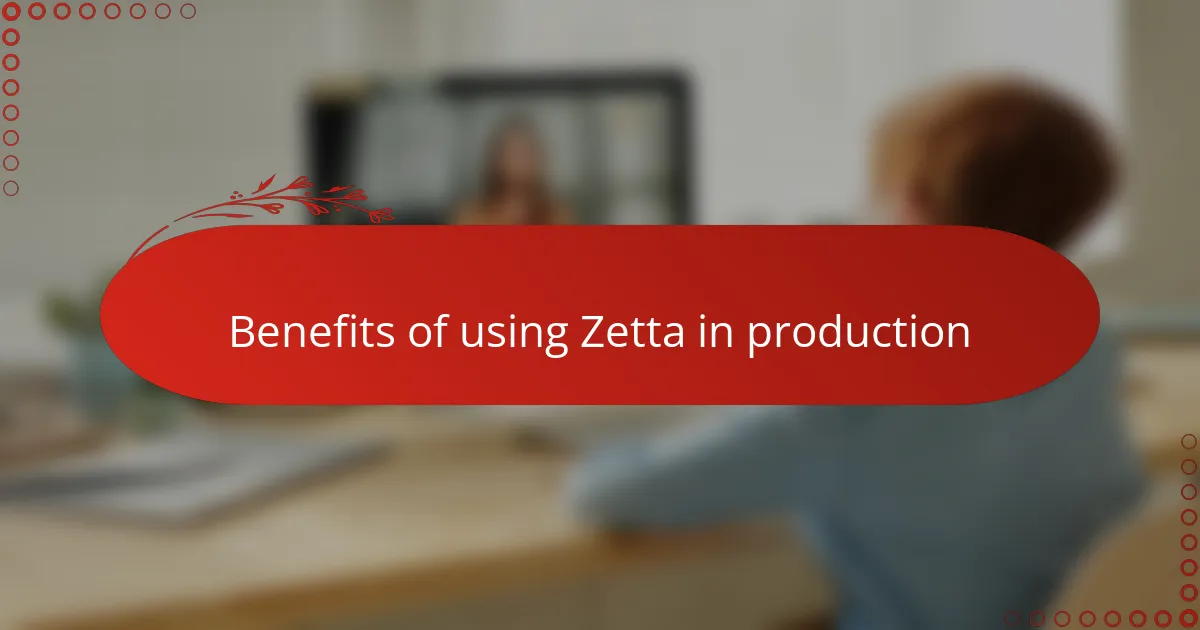
Benefits of using Zetta in production
One of the biggest benefits I’ve noticed with Zetta in production is how much it simplifies complex workflows. There was a time when coordinating different audio elements felt like a juggling act, but Zetta’s intuitive interface made managing those layers feel almost effortless. Have you ever experienced that satisfying moment when technology just clicks and lets you focus on your creative instincts? That’s exactly what Zetta delivers.
Another advantage that really stands out to me is Zetta’s reliability during live shows. I recall a broadcast where unexpected changes popped up, yet Zetta’s automation handled transitions smoothly without any hiccups. It gave me peace of mind knowing I could trust the software to keep things flowing, freeing me to engage with the content and audience instead of firefighting technical issues.
What I appreciate most, though, is how Zetta enhances collaboration among the production team. With everyone able to access the system easily and coordinate tasks in real-time, communication felt more seamless than ever. In a fast-paced environment like radio, having that kind of synergy isn’t just a bonus—it’s a game changer. Wouldn’t you agree that when your tools bring people together, the whole show benefits?
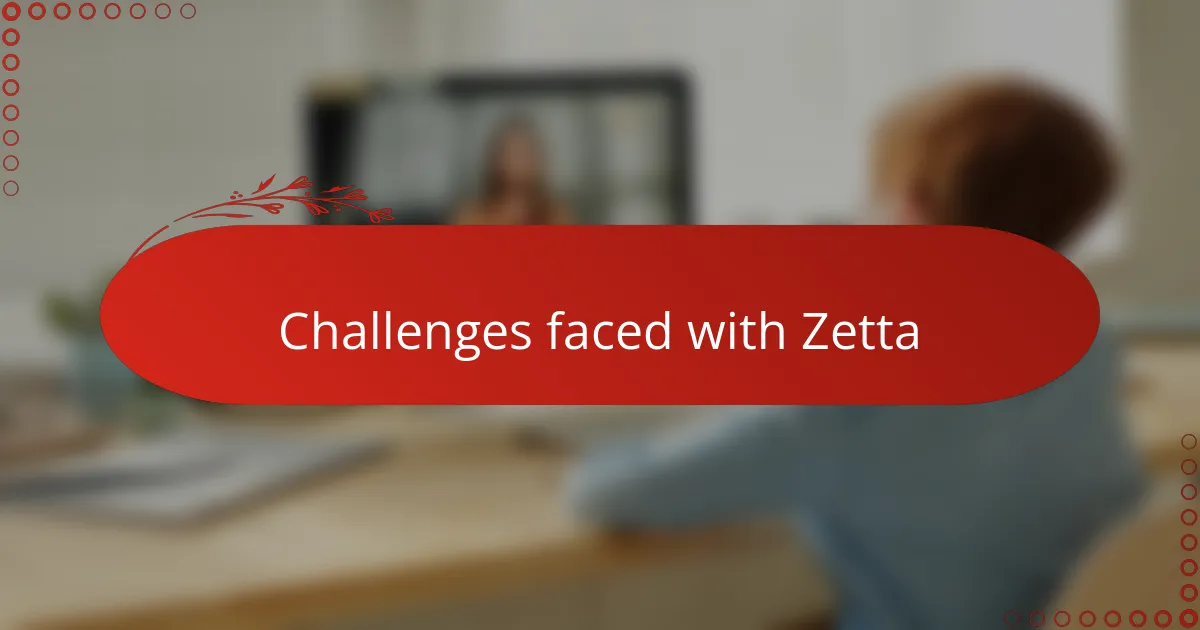
Challenges faced with Zetta
Sometimes, Zetta can feel a bit overwhelming when you’re new to it. I remember my first week trying to customize automation rules—it took longer than expected, and I questioned if the learning curve was worth it. Have you ever faced software that promises ease but ends up testing your patience? That’s the tricky part with Zetta.
Another challenge I faced is occasional glitches during high-pressure live shows. On one unforgettable evening, a minor bug caused audio delays, making me scramble to keep the broadcast seamless. Moments like that remind me that even the best systems aren’t foolproof and highlight the need for quick troubleshooting skills.
Also, the integration with some third-party hardware wasn’t always smooth. I found myself juggling driver updates and compatibility checks more often than I’d like. Do these hiccups mean Zetta isn’t reliable? Not necessarily—but they do require a bit of extra tech savvy and preparation to avoid on-air disruptions.
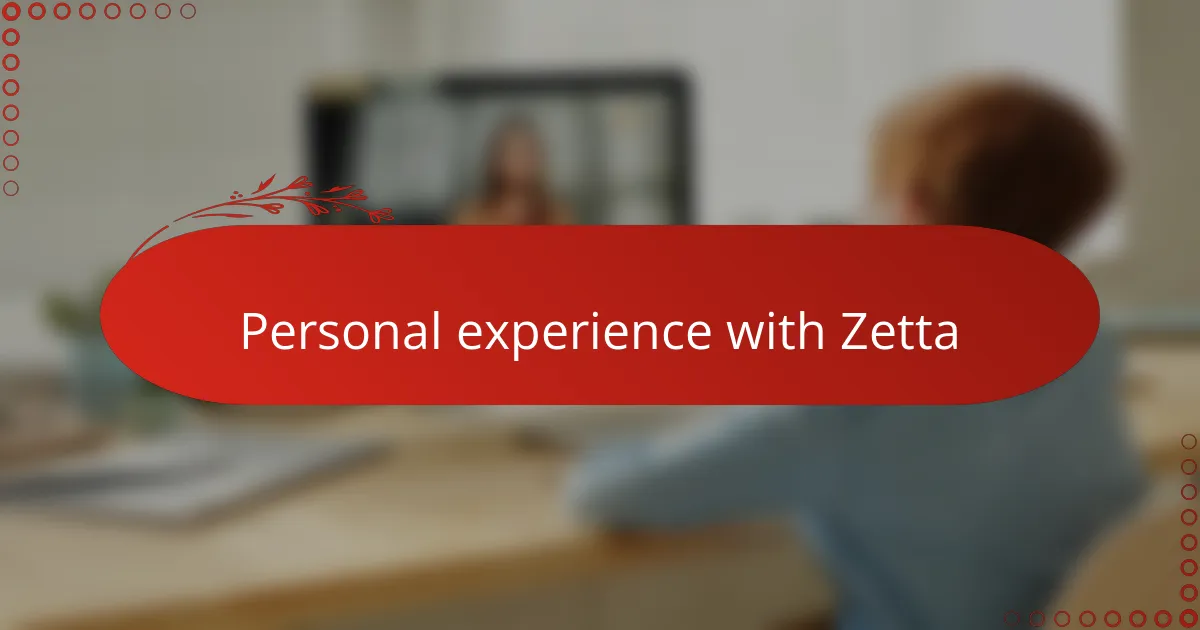
Personal experience with Zetta
Using Zetta felt like discovering a trusted teammate in the studio. I remember one late-night broadcast when a last-minute playlist change threw the whole schedule into chaos, but Zetta adapted so quickly that I hardly missed a beat. Have you ever had a moment when technology almost feels like it’s reading your mind? That’s how seamless it was.
At first, I was a bit intimidated by Zetta’s depth—there’s a lot under the hood. But once I got comfortable, I noticed how much it empowered my creativity instead of limiting it. It became less about wrestling with software and more about shaping the sound I wanted to deliver. That shift made all the difference in how I approached each show.
What really struck me is how Zetta supports collaboration without making things complicated. During team productions, the way it keeps everyone on the same page felt like having a shared rhythm in the booth. Isn’t that the kind of smooth synergy every radio crew wishes for? From my experience, Zetta brings that vision closer to reality.
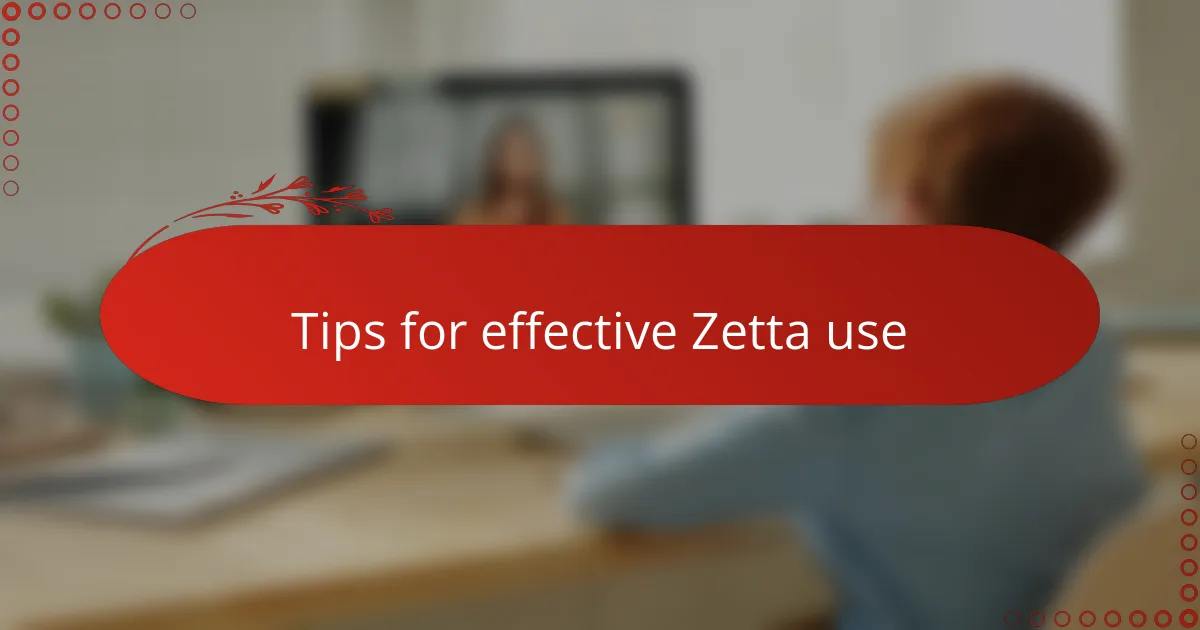
Tips for effective Zetta use
One tip I’ve found essential for making the most of Zetta is to invest time in mastering its automation rules early on. I remember feeling a bit overwhelmed at first, but once I took the time to really understand how to customize those settings, the software started anticipating my needs rather than slowing me down. Have you ever noticed how a little upfront effort can save you countless headaches during a live show? That’s definitely true with Zetta.
Another thing I recommend is leveraging Zetta’s live assist mode whenever possible. This feature became my safety net during unpredictable broadcasts—like when a guest ran late or a last-minute song change was needed. It gave me the flexibility to adapt on the fly without feeling like I was scrambling behind the scenes. From my experience, embracing this mode transforms stress into confidence.
Lastly, don’t underestimate the value of regular system checks and hardware integration tests before going live. I’ve learned the hard way that minor glitches often come from overlooked compatibility issues. By proactively running these tests, I saved myself from frustrating moments of scrambling to fix unexpected delays. Isn’t prevention always better than cure when you’re live on air? With Zetta, that preventative mindset really pays off.
